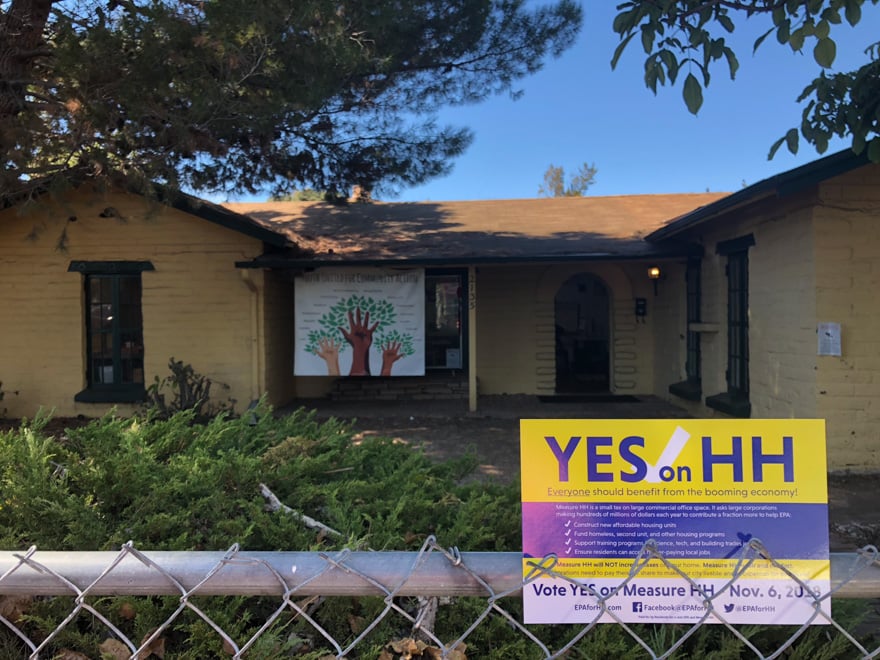Volunteers gathered inside of an East Palo Alto (EPA) youth-centered community center on Saturday morning to canvas for Measure HH, a tax on large commercial office real estate that is on the ballot Nov. 6.
If passed, the revenue generated from the tax would be primarily earmarked for construction of new affordable housing and job training in the tech industry for members of underprivileged communities. The measure would entail an annual parcel tax of $2.50 per square foot on office property of over 25,000 square feet. It could provide up to $1.6 million annually from existing developments.
The brunt of the tax burden would be on tech companies such as Amazon, which have recently taken up office space in Palo Alto.
EPA is an anomaly in the Silicon Valley area. The small city of approximately 29,000 residents is sandwiched between the more affluent cities of Palo Alto and Menlo Park. It has long served as an affordable region for low-income households, but locals have recently voiced concerns regarding housing affordability and gentrification.
“Residents for a Just EPA for Measure HH” Volunteer Coordinator Ofelia Bello expressed support for Measure HH, describing it as an “anti-displacement” policy that responds to the intense housing pressures on EPA locals, including urban displacement, homelessness and RV evictions.
Bello, who is an EPA resident, said she also supports the job training programs that Measure HH would fund.
“[We need to] make sure that jobs are actually stable. They need to not be just minimum wage jobs that don’t pay the rent, but living wage jobs,” she said.
“It’s a grassroots effort,” added volunteer Francisca Guzman, referring to how Measure HH was developed.
Guzman said supporters of Measure HH had been figuring out ways to raise money for issues that affect locals.
“Technology, big corporations coming into our city affect the traffic, affect our quality of life, and they leave nothing for us, and they don’t employ our community necessarily,” Guzman said.
Other local cities are considering taxes on big tech companies in order to preserve affordability in the local community. Mountain View has proposed a “head tax” on large employers like Google. Cupertino, on the other hand, recently abandoned an effort to instate a per-worker tax on Apple.
If passed, the tax will affect only a few large businesses, including the Four Seasons Hotel and Amazon. However, the city anticipates a large amount of new development in the near future, which could facilitate even more tax revenue.
“East Palo Alto has just approved [its] planning code. There’s a lot of square feet that are going to be approved in five to 10 years of office space,” Guzman said. “We believe the city’s going to be in a position of approving other companies coming in.”
Bello explained that tensions have been running high between big tech and East Palo Alto residents ever since the companies began eyeing and purchasing real estate in the city.
Last year, Amazon proposed a workaround for the East Palo Alto ordinance that requires companies to hire at least 30 percent of its workforce from the local community, sparking backlash from EPA residents who felt overlooked.
“Overall the community sense of Amazon and big tech is not a good one,” Bello said.
She expressed hope that improving relations with the local community could be mutually beneficial.
“[Companies] have a lot to gain from helping us stabilize our vulnerable communities because if our folks are able to stay in their homes and save some money and send their kids to college, we’re expanding the pool of diverse candidates who could work for your company and could reflect the staff numbers of the people you serve,” she said.
Measure HH needs a two-thirds vote to pass on Nov. 6. Bello said that a main impediment for supporters of the measure is the expected low voter turnout in the area, which is why the volunteers have been trying to spread the word.
“We know that the people who have historically been in East Palo Alto are well aware of the issues that plague us, and if we mobilize and reach out to them, our gut feeling is that they are in favor of the measure, but with our ‘new neighbors,’ if you will, we’re not quite sure,” Bello said. “When you’re of higher class, of higher income, it’s hard to tell how well connected you are to our community and to the issues that we face and to the solutions.”
Amazon has not responded to The Daily’s multiple requests for comment.
This post has been updated to clarify that Ofellia Bello is the volunteer coordinator, not the director, of “Residents for a Just EPA for Measure HH.” The Daily regrets this error.
Contact Nohemi Davila at nohemi ‘at’ stanford.edu.
